欧博Ultimate Cape Town Travel Guide for First
This Cape Town travel guide covers everything you need to know—from the best neighborhoods to stay in and how to get around to safety tips and must-try restaurants. It’s loaded with insider tips to help you have an unforgettable trip!

Cape Town is easily one of my favorite cities in the world. I’ve been lucky enough to visit five times (and counting!), and I typically spend around three months a year here, living as a digital nomad.
No matter how many times I return, I always find new places to explore, incredible food to try, and views that never stop taking my breath away.
But I still remember my very first trip. I was overwhelmed by all the choices—where to stay, how to get around, and which of the many must-see spots to prioritize.
If you’re feeling the same way, don’t worry—I’ve got you covered. In this guide, I’ll share all the essential tips I’ve learned over the years and answer the biggest questions first-time visitors have, like:
Where’s the best place to stay in Cape Town? I’ve tested out quite a few!
Is Cape Town safe for tourists? Let’s talk honestly.
How do you get around the city? I’ll break down the best (and worst) options.
What’s the food scene like? Spoiler: It’s amazing, and I have so many recommendations.
If you’re planning your first trip, this Cape Town travel guide will help you feel prepared and excited for an unforgettable adventure. Let’s dive in!
Cape Town Travel Guide Best time to visit Cape Town
As with any question like this, the answer really depends on what you plan to do and your personal travel style.
In my opinion, the best time to visit Cape Town is December through April (more or less the summer months in the southern hemisphere).
Unless you want to pay a premium for accommodation and have your plans set months in advance, I’d strongly suggest you avoid the Christmas and New Year holidays. January is also a very busy and expensive month that may be best to avoid.
February is the sweet spot where summer is still in full-swing, but Cape Town is easing out of peak season. March and April are both great months to visit with beautiful weather and less crowds.
→ Psst! You’ll find our guide to the best time to visit South Africa helpful to get the full breakdown on what makes each season distinct and unique to help cater to your trip.
How many days do you need?
Cape Town is a city bubbling over with culture, adventure and tons of things to do and see. A few days is simply not enough time!
My recommendation is to spend a minimum of 5 daysin Cape Town—more if you can swing it!
Here’s what 1-2 weeks looks like for a trip to Cape Town:
5 days: If you’re strategic about planning, you could fit our top things to do (listed below) into 5 days.
1 week: This will give you a bit more wiggle room to relax. You might get some beach time in, or choose a couple more activities.
10 days: Now we’re talking! You can get a pretty good taste of Cape Town with 10 days to plan activities.
2 weeks: That’s more like it! With 2 weeks, you’ll have enough time to tackle a good bit of things to do from this list. Pick and choose which activities to prioritize and don’t forget to schedule in some down time to relax and soak it all in.
Things to Do in Cape Town
If you’re looking for the very best things to do in Cape Town, here are my top recommendations:
Catch an epic sunset
Go up Table Mountain
Hike Lion’s Head
Check out the V&A Waterfront
Do a kayak tour of the bay
Tour Robben Island
Wine tasting in the vineyards
Kirstenbosch Botanical Garden
Cape Point & Cape of Good Hope
Meet the penguins at Boulder Beach
We have an entire article dedicated to the best things to do in Cape Town where we share details and tips for first-time visitors.
50 Super Fun Things to Do in Cape Town, South Africa
How to get to Cape Town city center from the airportThe Cape Town International Airport (CPT) is located about 20 km (12.5 miles) from the city center. The drive takes about 20 minutes with no traffic*, but can easily take up to 45 minutes with traffic.
*Depending on where in Cape Town you will be staying (more on that below) you could add up to 30 minutes to your drive time from the airport.
All that being said, Uber is your best option for getting from the airport into the city. Unless you’ve rented a car for the duration of your stay, in which case you can drive your rental car into town.
Uber is widely used and very affordable. For example, a ride from the airport to my apartment in DeWaterkant cost me just R250 (~$14 USD) in 2025. In previous years I’ve paid about the same cost to get to and from the airport.
How to get around Cape Town
Cape Town is a vast, sprawling city with lots to explore in every different corner. The public transportation system is lacking and you’ll likely need to rely on rideshare apps like Uber.
There are also a lot of vehicles on the road, especially during peak season. Traffic can become a bit of a deterrent, and you’ll definitely want to check traffic conditions before you head out on the road.
That being said, the cost of transportation is inexpensive for foreigners spending USD, Euro, etc. and it’s easy to navigate the individual neighborhoods without your own vehicle.
Uber/rideshare appsUber is widely used around Cape Town and is the safest and most affordable way to get around. There are other rideshare apps popping up to compete with Uber in Cape Town as well.
Always check that the car number matches your app before you get in. And don’t expect the nicest vehicles. Oftentimes the cars are quite run down and may not have AC (you’ll need to choose Uber Black if you want a more luxurious ride).
Note: It is recommended not to hail cabs from the street as these are not as reliable as Uber.
Insider Tip: Uber Eats is also a thing here, and with minimal delivery fees, it definitely comes in handy!
Get a rental carRental cars in Cape Town are inexpensive compared to prices in the US or Europe. Just remember the driving is on the left side of the road, and the cheapest rental options require use of a manual transmission.
It’s often safest to plan where to park before you get to a destination, and don’t leave ANY belongings in the car when parked.
We use Discover Cars to search and compare prices from all the rental car options in the area, and have found it generally saves us money in the long run. Discover Cars pulls information from a large number of companies to find you the best price for your rental car.
Search & Compare Rental Car Prices
Discover Cars
Booking.com
Public bus systemCape Town has a variety of different privately-owned bus services, but MyCiti is by far the most popular for getting around. It’s cheap and connects the city center to popular landmarks.
Note the MyCiti buses don’t accept cash, so you’ll need your own myconnect card to travel around. You can pick one up at the bus station or at select retailers around Cape Town.
AlternativeIf you’re planning on traveling around South Africa, renting a campervan is a great way to see the country. You can pretty much go anywhere and you don’t have to pay for hotels.
We recommend Happy Campers because they are a family-run company with great service and awesome vans.
Is it safe to travel to Cape Town?
The short answer is: yes. Of course, there is always a caveat to that.
As with any major city, there are safer areas of town and areas that you need to be more cautious in. I’ve stayed in the Sea Point, Green Point and DeWaterkant neighborhoods and felt very safe walking the streets during the daytime and in my home at night.
The downtown area where Long Street is located (the popular street for nightlife) is a bit of a different story and precautions should be taken when getting around there.
Before you ask… yes, there is crime in Cape Town, just like in any major city. Most of the crime in Cape Town is opportunistic. This means that if you make it easy for them, people will take advantage of you. As a tourist, you are already a high target.
Does that mean you should stay locked in your hotel or apartment all day and only leave home with a money belt tucked under your shirt? No.
Tips for staying safe in Cape Town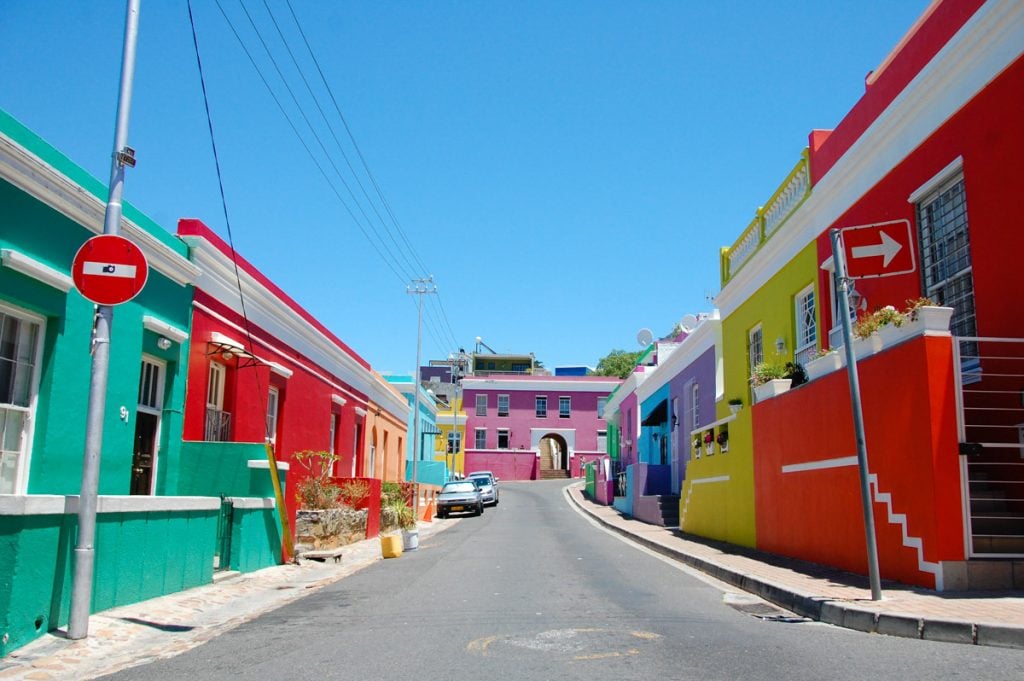
Never walk alone after dark, no matter where you are staying. Muggings are not unheard of in Cape Town.
Be sure all of your valuables are on you at all times and don’t hang your purse on the back of your chair while streetside dining.
Don’t leave your belongings unattended, especially not in a rental car or at the beach.
If parking on the street overnight, be sure to empty your car of everything in view from the windows. And do not leave valuables in your car overnight.
When driving through downtown city center, don’t use your cell phone next to an open car window. If you’re sitting in traffic, it’s far too easy for a passerby to reach in and grab it from you (unfortunately I’ve heard of this happening).
Keep your car doors locked when driving.
Always be aware of your surroundings – this includes watching your alcohol consumption. Trust your instincts and if a person or a place feels unsafe, get out without stopping to think twice.
All that being said, this city has far too much to offer to let fear discourage you from visiting. If you are smart and stay aware, you likely won’t run into any trouble. Instead you’ll return with a boatload of stories to make friends and family back home jealous of your travels.
More tips for visiting Cape Town
Here are our top tips for visiting Cape Town, South Africa to make the most out of your stay.
Currency: The national currency is the South African Rand (shown as R25).
Credit cards are widely accepted, including your American Express card.
A word of caution: As in most places, you need to be careful about credit card fraud, but in South Africa in particular. There are a lot of instances of card numbers getting stolen and used after you’ve swiped. (This happened to me on 3 separate occasions while I was traveling in South Africa.) Use a tap-to-pay app like Apple or Google Pay to protect yourself.
Never use money exchanges, especially not at airports, as these take a large cut and the exchange rates are usually outrageous. Cash may not even be necessary depending on your stay. Last time I visited Cape Town for 3 months and didn’t take out any cash at all.
Insurance: It’s always a good idea to have travel insurance when traveling abroad (we never leave home without it!). Especially especially in a place like Cape Town where you’re likely to be having some active adventures and petty crime is also an unfortunate possibility.
Where to eat in Cape Town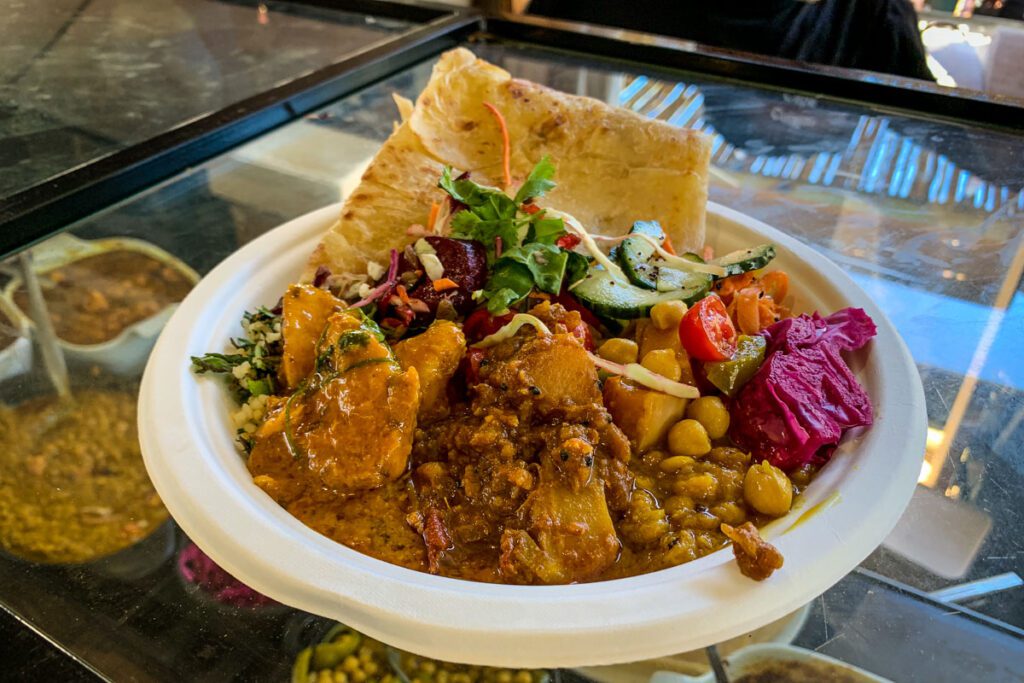
From vibe-y international fusion to some of the most acclaimed restaurants in the world, Cape Town puts exceptional cuisine right at your fingertips.
Important Note: For the majority of restaurants in Cape Town you will need to make a booking ahead of time to secure your spot (especially if visiting during summer!). It is not as common for places to save tables for walk-ins.
*These cafes also offer wifi and make great spots for coworking.
Staples


Bao Down(Green Point): An unassuming restaurant that serves exceptional Asian food, most namely their bao buns, in small tapas-style plates.
The Korean Fried Chicken bao are a must!
Pizza Shed (downtown): Neapolitan-style pizza with the fluffiest crust you could imagine.
Una Más Mezcaleria(Sea Point): Elevated Mexican food- their cocktails are a must!
Maria’s Greek Cafe (Gardens): As close to authentic Greek food as you’ll find in Cape Town.
Giovanni’s(Green Point): A classic Italian deli and local secret. You can order take-away and have yourself a healthy picnic on the beach.
Food Halls/Markets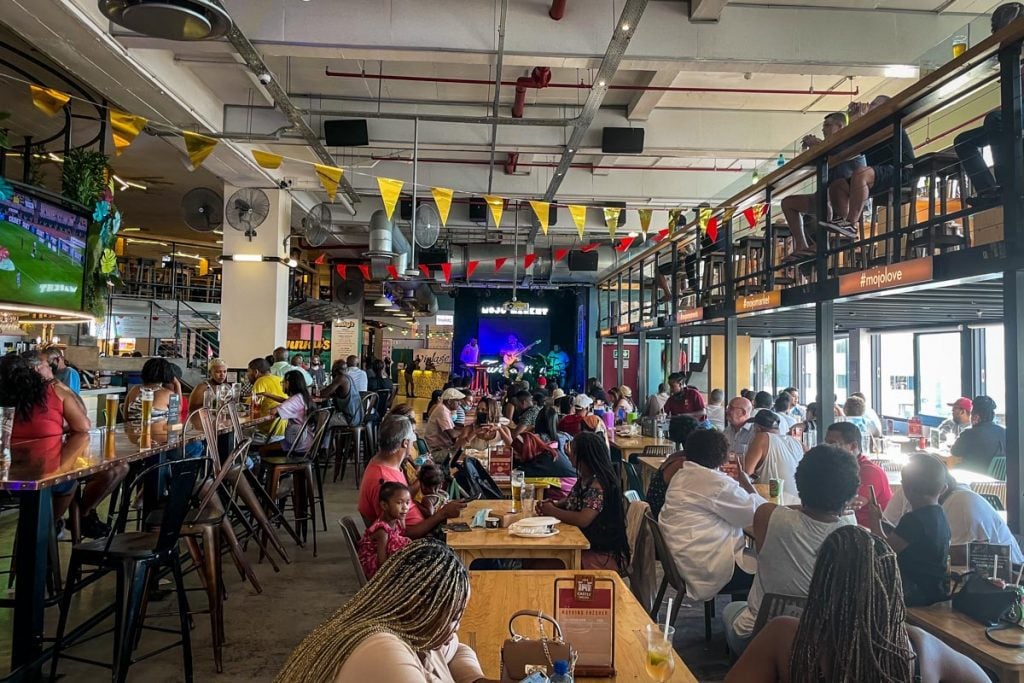
Time Out Market* (Waterfront): The global brand has opened it’s doors in Cape Town. This massive food hall features some of the best local chefs, craft cocktails, and live music—all in a prime location overlooking the harbor.
Oranjezicht Market (Waterfront): This farmer’s market is only open Wednesday evenings and weekends, but it has a large array of food stalls (definitely come hungry!), fresh produce, breads, meats, artisan crafts, and locally made products for sale.
Neighbourgoods Market (Woodstock): Very similar to the above but in a different location at the Old Biscuit Mill, this market is only open on weekends.
Vibe-y


Mantra Cafe* (Camps Bay): This cafe-by-day, bar-by-night overlooks Camp’s Bay Beach with a modern boho chic vibe.
Tjing Tjing (downtown): Enjoy cocktails and tapas in this Chinese-inspired 200 year old house with a rooftop bar.
Asoka (downtown): Featuring a DJ and live music most nights, this is a hip spot for eats and drinks.
Fine Dining Tasting Menus


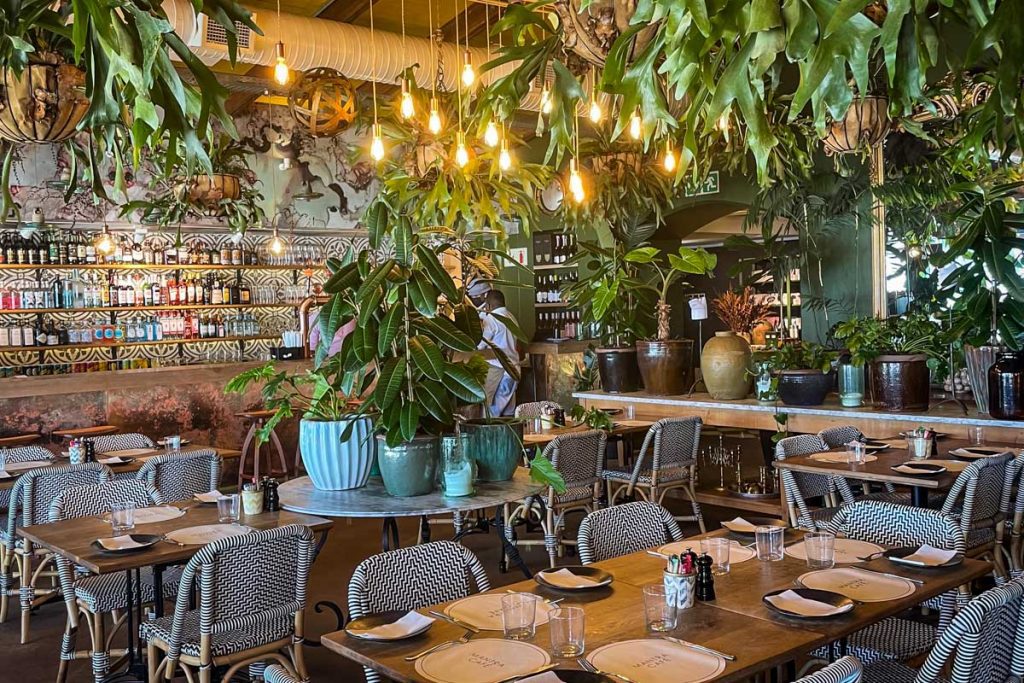

Gigi Rooftop Bar downtown
The Silo Rooftop at the V&A Waterfront
Radisson RED Rooftop at the V&A Waterfront
Hugo Social Club in Sea Point
Drinks

In short, if it is your first time visiting Cape Town, The Waterfront and Sea Point are the most popular neighborhood choices. You’ll be near many big attractions, making these super convenient areas to base yourself. Plus, there are lots of hotels and Airbnbs to choose from.
If you are a return traveler,or just looking for a more residential area, I recommend looking into Green Point (more budget-friendly). And if you want to be close to the action in the CBD without staying downtown, Dewaterkant is a great option with more modern high-rises at affordable prices.
Plan your trip to South AfricaWe have TONS of resources on travel in South Africa and how to make the most out of your trip. Check out our South Africa Homepage for all the answers to your most popular questions, or read some of our favorite articles below.
Don’t miss your chance to grab our custom Cape Town map!
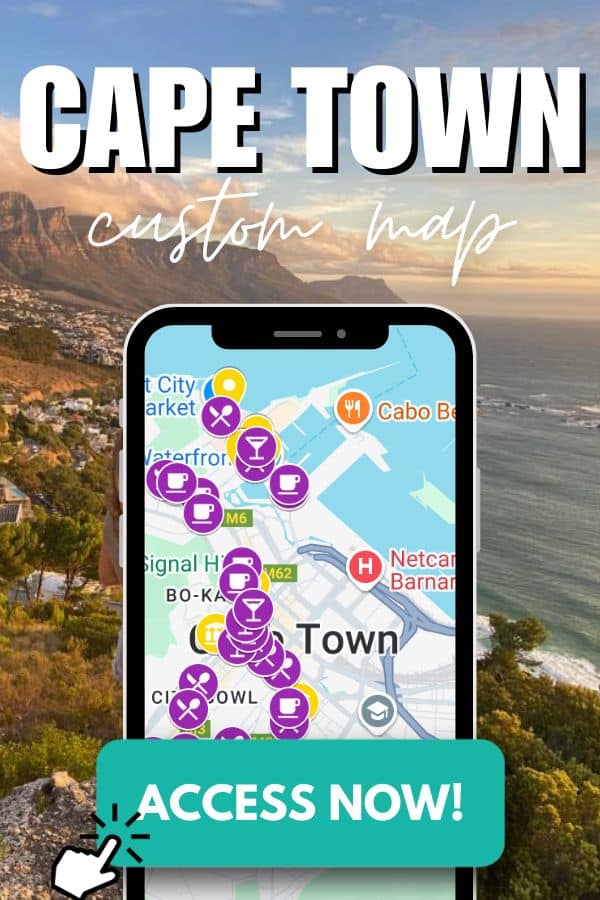
Get our Custom Cape Town Map sent straight to your phone! We loaded this map with all our favorite restaurants, hidden gems, sights and activities, so you can make the most of your time in the Mother City.
Just enter your email and we’ll immediately send you access instructions!
Save this article on Pinterest for later!


Was this Cape Town travel guide helpful? Are you planning a trip to Cape Town and still have questions? Leave your comment below and we’ll do our best to get back to you with the answers you’re looking for!